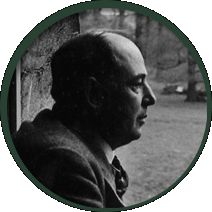 I think I’m doing what C. S. Lewis wanted readers of his Reflections on the Psalms to do: I’m reflecting. He provides such good material for reflection as he shares insights in this little book.
I think I’m doing what C. S. Lewis wanted readers of his Reflections on the Psalms to do: I’m reflecting. He provides such good material for reflection as he shares insights in this little book.
For instance, he refers to how the psalms always talk about seeing the beauty of the Lord, yet it’s not the Lord directly that the typical Jew saw, but rather the rituals in the Temple or some other aspect of the outward symbols of God’s presence.
That’s good, as far as it goes, but Christians need to make the distinction between that which symbolizes God and God Himself. There is a danger in becoming too attached to the symbol:
When the mind becomes more capable of abstraction and analysis this old unity breaks up. And no sooner is it possible to distinguish the rite from the vision of God than there is a danger of the rite becoming a substitute for, and a rival to, God Himself. Once it can be thought of separately, it will; and it may then take on a rebellious, cancerous life of its own.
We are to worship God, not the external artifacts that point to Him. If we revere those outward signs of His presence more than the Presence Himself, we are setting up a false god, which is in direct contradiction to both the spirit and the letter of the Word.
Lewis provides this example as an illustration:
There is a stage in a child’s life at which it cannot separate the religious from the merely festal character of Christmas and Easter. I have been told of a very small and very devout boy who was heard murmuring to himself on Easter morning a poem of his own composition which began “Chocolate eggs and Jesus risen.” This seems to me, for his age, both admirable poetry and admirable piety.
That would be “for his age.” But we don’t stay children, and neither should our worship remain wedded to a child’s understanding of the object of our worship. Lewis continues,
But of course the time will soon come when such a child can no longer effortlessly and spontaneously enjoy that unity. He will become able to distinguish the spiritual from the ritual and festal aspect of Easter; chocolate eggs will no longer be sacramental.
What must we do, then, when we reach that point, and we begin to grasp the difference? We have a choice to make:
And once he has distinguished he must put one or the other first. If he puts the spiritual first he can still taste something of Easter in the chocolate eggs; if he puts the eggs first they will soon be no more than any other sweetmeat. They have taken on an independent, and therefore a soon withering, life.
The symbols will never satisfy the inner longing of our hearts. Clinging to them and believing them to be the substance of our faith will lead only to what Lewis rightly calls “a soon withering life.”
May our worship and the presence of God be the real thing. May our spiritual eyes see Him above all else, and relegate all that points to Him as secondary. In heaven, we will see Him face to face. I would like to begin that experience now, as far as this temporary earthly life will allow that to happen.
